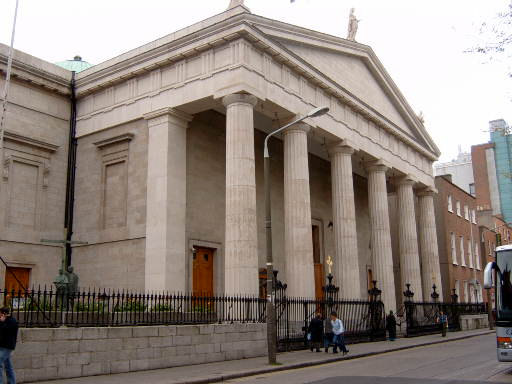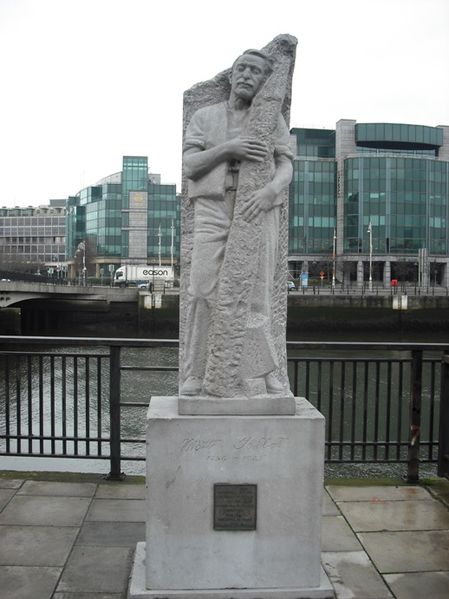St Mary's Pro-Cathedral, completed in 1825
Today's Irish Times carries a story, Fewer than one in five attend Sunday Mass in Dublin, which reports the words of Archbishop Diarmaid Martin of Dublin at the ordination yesterday of seven deacons. “Many young people, despite years of religious education, have only marginal interest in the message of Jesus. Many who come to us today possess only a sort of cultural Catholicism which can easily deceive us about the depth of people’s faith,” said the archbishop. “Faith in Jesus Christ and in his church is not a free-for-all of opinions in which anything goes. Faith in Jesus has content and context. It is about knowing Jesus intimately.
The archbishop said the years ahead must be ones of renewal for the Irish church and he urged the seven deacons to play a critical role in that renewal. “I encourage you to reach out to the coming generations, presenting them in unambiguous terms the teaching of Jesus and challenging them not to be afraid to let the message of Jesus change their hearts,” he said.
Christ Church Cathedral, originally Catholic now Anglican
Recently Archbishop Martin said that in some areas as few as two percent attend Sunday Mass. these would be mostly poorer parts of the city.
Up to the 1970s more than 90 percent of the people went to Mass every Sunday. So what is happening now is a huge change.
General Post Office (GPO) in the heart of the city. I was approached by two beggars here the first time I went into the city centre on this visit.
But one thing hasn't changed. The priest is still a target for beggars and drunks in the city centre. I've gone there a number of times during my current brief visit to my native city. I wore my clerical collar each time except today. When I was wearing it beggars made their way to me, all addressing me as 'Father'. One was a young Irishman talking into his mobile phone and I waved at him while passing on. antoher was a young woman, probably from Romania, who, when I made an excuse and didn't stop said 'But you are a Father!' At one time I might have felt guilty. I did feel a mild pang of guilt but not enough to spoil the lunch with old school friends I was heading for.
The Spire of Dublin in O'Connel St, behind the statue of Jim Larkin, a labour leader in the early part of the last century. The GPO is on the left. The Spire replaced Nelson's Pillar, blown up in 1966.
Last year as I was walking in another part of the city during the day a man in his 30s stopped me. He wasn't a beggar but if I had lit with a match the alcohol he was breathing out half of the city might have been destroyed in the ensuing explosion.
In my time in the seminary students wore a black suit and black tie when outside. We wore a soutane inside. Although students by definition hardly every have money to spare I was still a target for beggars and drunks. Sometimes the drunk was also a beggar. Sometimes he wanted to engage in an alcoholic discussion about theology or the Church. This happened more often on occasions such as wedding receptions.
Statue in O'Connell St of Fr Theobald Mathew OFMCap, 1790-1856, who promoted temperance
For years I didn't wear my collar when going to the city centre, mainly because of beggars. I normally wear it now and simply keep going if a beggar tries to accost me. I've never been able to deal graciously with beggars or drunks, though on this visit I haven't been rude to any I have met.
Statue of the Venerable Matt Talbot 1956-1925, who led a life of great austerity, under spiritual direction, for the last 40 years of his life after having been addicted to alcohol. You can read a brief biography of Matt here.
In the Philippines there have been occasions when individuals whom I saw simply as beggars became real persons for me when I listened to their story. In a couple of cases I would give a weekly 'allowance' on a fixed day. If they approached me on another day I'd smile and remind them of our agreement. In these situations both parties retained their dignity. These persons came to know me as an individual too and not someone to make feel guilty by a sort of 'blackmail', like the young woman in Dublin last week who reminded me that I was 'a Father'.
I prefer to channel what people give me to such projects as Holy Family Home for Girls in Bacolod City (above). I know too that many in Ireland are working with those on the margins there.

.jpg/544px-Christ_Church_Cathedral_(Dublin).jpg)





5 comments:
Very interesting Father. There was an Anglican clergyman on the radio a few years ago complaining that when he walked around Dublin people would confuse him with a Catholic priest and he would get hassle over the sex scandals.
Sadly I think Archbishop Martin is in over his head. The Church in Ireland is indeed collapsing but he prescribes no effective solutions. He once said that Irish students are the catechised in Europe. I'm 21 so I'm not that long out of secondary school but I learned absolutely nothing whatsoever about Catholicism in my religion classes (and some of them were given by the Catholic (priest) chaplain).
The sex scandals will blow over in time. To a certain extent they already have. But the problems in the Irish Church are much deeper: liturgical and catechetical anarchy have done far greater damage to popular piety than than all the abuse reports combined.
Last week I attended Sunday Mass in Curragha, Co Meath - less than twenty miles from O'Connell St ("down the country" as Dubs would say). The liturgy left a lot to be desired but the small rural church was almost full. A big change from Dublin where these days most worshippers seem to be Poles, Filipinos and south Indians..
Ixoa, thanks for your comment. Here is the full quotation you referred to in Archbishop Martin's talk in Cambridge on 22 February: 'Young Irish people are among the most catechised in Europe but apparently among the least evangelized. Our schools are great schools; our young people are idealistic and generous, but the bond between young people and Church life ends up being very weak'. [http://www.dublindiocese.ie/index.php?option=com_content&task=view&id=2293&Itemid=372].
You would seem to question the part about the young Irish being the most catechised in Europe. You are in a far better position than I am to judge that. However, the evidence is that the archbishop is correct about the second part.
As far as I can see, Archbishop Martin is the only Irish bishop who constantly points out the realities of the situation. Recognising and naming a problem is the beginning of a solution or a response. His words last Sunday, which I used in the blog entry, echo what Pope Benedict has been constantly saying about our faith being in Jesus Christ and of being invited into an intimate relationship with him and the Holy Trinity: 'Faith in Jesus Christ and in his church is not a free-for-all of opinions in which anything goes. Faith in Jesus has content and context. It is about knowing Jesus intimately'.
He is also emphasising there the importance of teaching the truth.
Archbishop Martin puts all his comprehensive homily and lecture notes online, a big help.
Crux, maybe the introduction of the new English translation with the preparation beforehand will be an occasion to improve the celebration of Mass. On the whole I find in my travels that a sobriety has returned, though 'Good morning' seems to be widespread. Here in Ireland the people tend to say 'Through him, with him, etc' along with the priest, something that came in in North America when I was studying there from 1968-71. Last Sunday I asked the people not to do so and to let the priest say the so-called 'peace prayer' before the Agnus Dei and to let the priest give the blessing at the end. These three parts of the Mass require the people to give a resounding 'amen'.
After Mass a young mother of five approached me and asked me why I had asked the people not to say the 'Through him, with him, etc'. She simply wanted to know. When I explained that those words are proper to the priest as he offers the sacrifice she was quite happy.
I find the widespread practice of the people saying 'Lord Jesus Christ . . .' a form of Irish piosity that makes me cringe. Four-letter words are used far too much in my native country but one that good Irish Catholics are somewhat shy of using is 'Amen'!
Sometimes I say those parts of the Mass in Latin. Nobody has ever objected.
Last Sunday I had three servers, two girls and a boy. One girl was Irish while the other two were a brother and sister from Cebu, Philippines.
Fr Seán: At the Mass to which I refer the priest actually encouraged the congregation to recite the concluding doxology with him. The previous day I had attended my cousin's daughter's First Holy Communion at the same church. The scripture readings were replaced by renderings from what I presume is some so-called children's liturgy and certainly not from any translation that I am familiar with. They were patronising in the extreme and an insult to the intelligence of the young communicants.
The Augustinians at John's Lane are also in the habit (no pun intended) of inviting the congregation to join in the 'peace prayer' before the Agnus Dei.
Enlightening post Fr Sean..I have many cousins in Dublin...
Post a Comment